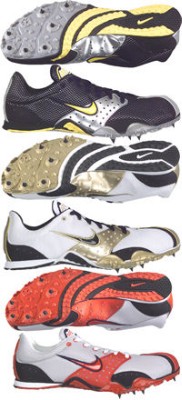|
Nutrition for optimal
Track & Field performance For the recreational or competitive athlete, the body must be fueled optimally to
exercise effectively. To maintain or improve strength, speed and stamina, one must consume
adequate amounts of protein, carbohydrate and fat. Carbohydrate Carbohydrate-containing foods have always been the staple of a sports diet, but many
athletes consume less than optimal amounts. Carbohydrate is the primary energy source for
high intensity, maximal-outburst activity, and a significant early fuel source for
endurance exercise. Consuming adequate amounts of carbohydrate maintains usual training
intensity and promotes rapid recovery. Carbohydrate containing foods should be eaten at each meal and also before, during and
after exercise. At meals, carbohydrates should take up about two-thirds of the plate.
Pre-exercise carbohydrates stimulate muscle glycogen storage and may help delay fatigue.
Carbohydrates consumed during exercise that lasts more than 60 minutes help the body
maintain blood glucose availability late in exercise. Post-exercise carbohydrates help
improve muscle glycogen storage, especially within 30 minutes after the activity. The body
can store twice as much muscle glycogen after consuming sucrose or glucose than after
fructose. Carbohydrate-containing foods
Carbohydrate guidelines Weight (in pounds) x 3 or 4 = number of grams of carbohydrate per day Specific requirements · Pre-exercise -- 50 to 100 grams of
carbohydrate 30 to 60 minutes before exercise (for example, a bagel, two granola bars or
concentrated carbohydrate sports drink) · During exercise -- 30 to 75 grams of
carbohydrate per hour (sources may include gels, sports drinks or gummy-type candy with
water) · Post-exercise -- 75 grams of carbohydrate
within 30 minutes (include sucrose or glucose containing foods, such as fruit punch,
sweetened cereals, crackers or gummy type candy) Protein Protein is not the body's preferred fuel source during exercise, but it has a role to
play in muscle growth and repair, and in boosting the immune system. Exercise can promote
muscle protein loss due to reduced protein synthesis, increased protein breakdown and
protein losses in urine and sweat. Some athletes tend to overdo on protein, while others
barely meet their needs. Food is the easiest, most effective and least costly way to meet
protein needs. If it seems difficult to meet the protein requirements, a scoop of nonfat
dry milk powder added to milk, sauces or soups, or a sports bar that contains protein can
help. Protein sources
Protein requirements
Fat This nutrient has gotten a bad reputation for increasing weight and disease risks. Fat
is the primary energy substrate for low intensity and moderate exercise, and consuming too
little fat may limit the duration and quality of exercise. Fat is an energy dense
nutrient, providing nine calories per gram. It is a good calorie source for active
individuals. Although a diet high in animal fats is not the goal, including nuts or olive
oil in the diet daily, and eating fatty fish, such as salmon or tuna, may benefit the
athlete's health and help prevent injury. Too little fat may limit performance by affecting intramuscular triglycerides, as well
as decreasing serum testosterone in male athletes. A little bit of fat prior to exercise
will probably digest better than a cheeseburger and fries. Although some researchers are
investigating fat loading prior to exercise, the current advice is to eat a mixed meal of
carbohydrate, protein and some fat. Fat sources
Fat requirements Desirable weight (in pounds) x 0.45 = number of grams of fat per day The bottom line
Leslie Bonci, M.P.H., R.D., is the director of Sports Nutrition for the Department
of Orthopaedic Surgery at the Disclaimer: The information, including opinions and recommendations, contained in this website is for educational purposes only. Such information is not intended to be a substitute for professional medical advice, diagnosis or treatment. No one should act upon any information provided in this website without first seeking medical advice from a qualified medical physician.
|






